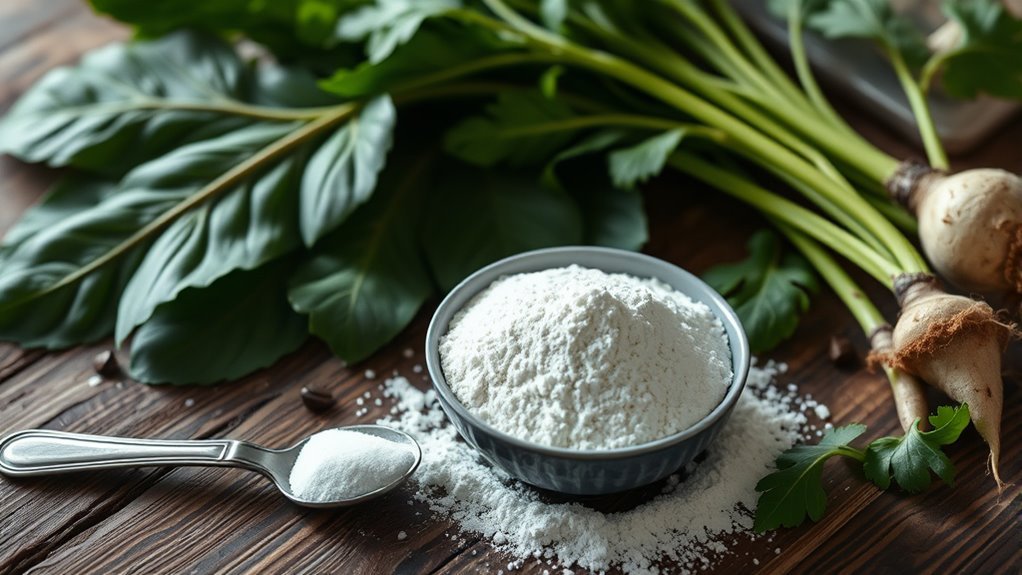Cassava flour isn’t considered keto-friendly due to its high carbohydrate content. With approximately 38 grams of carbs per 100 grams, it can disrupt ketosis, as keto diets typically limit carbs to 20-50 grams daily. While it’s versatile in baking, substituting only a small amount of it with low-carb flour alternatives, like almond or coconut flour, is recommended. If you’re curious about managing your carb intake while enjoying delicious meals, there’s much more to explore on this topic.
Understanding Cassava Flour

Cassava flour, derived from the cassava root, is gaining popularity as a gluten-free alternative for baking and cooking. Its origins trace back to South America, where indigenous communities have utilized the cassava plant for centuries. Today, it’s widely produced in tropical regions, making it accessible for various culinary applications. You’ll find cassava flour used in recipes for bread, pancakes, and even pasta, providing a versatile option for those avoiding gluten. Unlike traditional flours, it offers a unique texture and can absorb moisture well, enhancing the overall quality of baked goods. As you explore its uses, you’ll discover that cassava flour not only serves as a substitute but also brings a distinct flavor profile to your meals.
Nutritional Profile of Cassava Flour

When considering cassava flour, it’s important to look at its nutritional profile, particularly its carbohydrate content. You’ll find that it contains a significant amount of carbs, along with varying levels of fiber and protein. Additionally, cassava flour offers certain vitamins and minerals that can contribute to your overall diet.
Carbohydrate Content Analysis
While exploring low-carb alternatives, understanding the carbohydrate content of cassava flour is vital. This flour primarily consists of starchy carbohydrates, making it considerably higher in carbs compared to many keto substitutes. One cup of cassava flour contains approximately 38 grams of carbohydrates, which can disrupt ketosis if you’re following a strict low-carb diet. The carbohydrate types in cassava flour are mostly simple and complex sugars, contributing to its high glycemic index. For those seeking to maintain a ketogenic lifestyle, it’s important to take into account the impact of these carbs on your overall intake. If you’re aiming for a low-carb diet, you’ll likely want to explore other alternatives that align better with your dietary goals.
Fiber and Protein Levels
The nutritional profile of cassava flour reveals that it contains minimal fiber and protein levels, which are essential components for those following a balanced diet. If you’re looking for alternative fiber sources or protein types, cassava flour may not be your best option.
Here’s a quick comparison:
| Nutrient | Cassava Flour | Alternative Flour | Recommended Fiber Sources |
|---|---|---|---|
| Fiber (g) | 1.5 | 3-5 | Chia seeds |
| Protein (g) | 1.2 | 5-8 | Lentils |
| Carbs (g) | 78 | 60-70 | Almonds |
| Fat (g) | 0.5 | 2-3 | Flaxseeds |
Due to its low fiber and protein content, consider these alternatives to meet your dietary needs effectively.
Vitamins and Minerals Overview
Cassava flour offers a unique nutritional profile, particularly regarding vitamins and minerals. It’s low in vitamins, lacking significant amounts of A, C, or K, but it contains some B vitamins, which are essential for energy metabolism. While the vitamin content may not be extensive, cassava flour provides notable mineral benefits. You’ll find minerals like calcium, magnesium, and potassium, which are vital for bone health and muscle function. Additionally, it contains trace amounts of iron, which can aid in oxygen transport and energy production. While cassava flour can be a versatile ingredient, it’s important to pair it with other nutrient-dense foods to guarantee you’re getting a well-rounded intake of vitamins and minerals for peak health.
Carbohydrate Content and Keto Compatibility

When considering cassava flour for a keto diet, it’s essential to examine its carbohydrate content. Typically, keto diets restrict daily carb intake to around 20-50 grams, and cassava flour contains a significant amount, which may not align with those limits. Exploring alternatives that are lower in carbs could help you stay within your dietary goals.
Nutritional Breakdown of Cassava
Understanding the nutritional profile of cassava is essential for anyone considering its compatibility with a keto diet. Cassava is primarily composed of carbohydrates, with roughly 38 grams per 100 grams serving. This high carbohydrate content makes it challenging to fit into a keto lifestyle, where low carb intake is vital. While cassava has various uses, such as in gluten-free flour or as a thickening agent, its cultivation leads to a starchy root that can hinder ketosis. If you’re exploring cassava’s potential in your meals, be cautious. It may provide energy and dietary fiber, but its carb load could disrupt your keto goals. Always weigh your options carefully when incorporating cassava into your diet.
Keto Diet Carbohydrate Limits
For those following a keto diet, keeping track of carbohydrate intake is key to maintaining a state of ketosis. Typically, you’ll want to limit your daily carbs to about 20-50 grams, depending on your individual needs. This means carefully selecting your carbohydrate sources during keto meal planning. Focus on non-starchy vegetables, nuts, seeds, and low-carb fruits to stay within your limits. It’s essential to be aware of hidden sugars and high-carb ingredients that can easily derail your progress. Cassava flour, while popular in gluten-free diets, is high in carbohydrates and may not fit into your keto lifestyle. By prioritizing low-carb options, you can enjoy the freedom of keto while achieving your health goals. Additionally, understanding net carbs is crucial for effective carb management on this diet.
Alternatives to Cassava Flour
While cassava flour is a popular gluten-free option, its high carbohydrate content makes it less suitable for a keto diet. Fortunately, there are several low-carb alternatives you can consider. Here are three excellent options:
- Coconut Flour: With about 6 grams of carbs per 1/4 cup, it’s a great choice for baking and cooking. It’s also high in fiber, which can help with digestion.
- Almond Flour: This flour contains around 6 grams of carbs per 1/4 cup as well. It’s rich in healthy fats and protein, making it a staple for keto-friendly recipes. Additionally, it provides essential nutrients that support a balanced keto diet.
- Flaxseed Meal: With only 4 grams of carbs per 1/4 cup, it’s perfect for adding nutrition and a nutty flavor to your meals.
These alternatives can help you stay within your carb limits while enjoying delicious dishes.
Impact of Cassava Flour on Ketosis
Although cassava flour is often touted as a gluten-free alternative, its impact on ketosis can be significant. When you’re following a ketogenic diet, your goal is to maintain low carbohydrate intake to achieve ketosis. Cassava flour, derived from the cassava root, is high in carbohydrates, which can hinder your ketosis effects. Using this flour as a substitute for traditional flours may seem appealing, but it can easily push you over your daily carb limit. If you’re serious about staying in ketosis, consider the carb content of your flour substitutes carefully. Alternatives like almond or coconut flour might be more aligned with your dietary goals, helping you sustain the freedom that comes with a successful keto lifestyle. Additionally, understanding carbohydrate content is essential for making informed dietary choices, especially for those aiming for a low-carb diet.
Alternatives to Cassava Flour for Keto Dieters
Finding suitable flour alternatives is important for those on a keto diet looking to replace cassava flour. Fortunately, there are several nutritional substitutes that offer low carb options without sacrificing flavor or texture. Here are three popular alternatives:
- Almond Flour: Low in carbs and rich in healthy fats, almond flour is a great choice for baking.
- Coconut Flour: This flour is high in fiber and absorbs moisture well, making it ideal for various recipes.
- Flaxseed Meal: Offering omega-3 fatty acids, flaxseed meal is a nutritious, low-carb option that can add a unique flavor.
Additionally, incorporating low-carb vegetables into your meals can enhance nutrition and flavor while keeping you in ketosis. These alternatives can help you maintain your keto lifestyle while still enjoying your favorite dishes.
How to Incorporate Cassava Flour in a Keto Diet
Incorporating cassava flour into a keto diet requires careful consideration, as it is higher in carbohydrates compared to other low-carb alternatives. If you choose to use it, aim to substitute only a small portion of traditional flours in your keto recipes. You can blend cassava flour with almond or coconut flour to create balanced, lower-carb options. Try using it in moderation for dishes like pancakes or bread, where it can enhance texture. Additionally, consider cassava substitutes, such as flaxseed meal or psyllium husk, to further reduce carb intake. Always monitor your overall carbohydrate consumption to maintain ketosis, and be mindful of your body’s response to cassava flour in your diet.
Potential Health Benefits of Cassava Flour
While many people associate cassava flour primarily with its culinary uses, it also offers several potential health benefits that can be advantageous for those looking to diversify their diet. Here are three significant health benefits of cassava flour:
Cassava flour is not only versatile in cooking but also provides notable health benefits for a balanced diet.
- Digestive Health: Cassava flour is rich in fiber, which can help support a healthy digestive system, promoting regularity and preventing constipation.
- Allergy-Friendly: It’s naturally gluten-free, making it a suitable alternative for those with gluten intolerance or celiac disease.
- Energy Source: Being high in carbohydrates, cassava flour can provide a quick source of energy, making it beneficial for active individuals.
Incorporating cassava flour into your diet could enhance your overall health while offering a versatile ingredient for various recipes.
Final Thoughts on Using Cassava Flour in Keto Cooking
Although cassava flour offers various health benefits, using it in keto cooking requires careful consideration due to its high carbohydrate content. If you’re committed to a keto lifestyle, you might want to limit or avoid cassava flour in your recipes. While it can be a great choice for gluten-free baking, its carb count can hinder your progress on a ketogenic diet. Instead, consider healthy alternatives like almond flour or coconut flour, which are lower in carbohydrates and can be just as versatile. These options can help you maintain the deliciousness of your keto baking while staying aligned with your dietary goals. Ultimately, balancing taste and nutritional needs is key to enjoying freedom in your cooking. Additionally, opting for low-carb alternatives can make it easier to stick to your keto goals while still enjoying a variety of dishes.
Frequently Asked Questions
Is Cassava Flour Gluten-Free?
Yes, cassava flour is gluten-free. It’s made from the cassava root, which naturally contains no gluten, making it a great alternative for those with gluten sensitivities. Regarding nutritional benefits, it’s rich in carbohydrates and provides some fiber. Its culinary uses are diverse; you can use it in baking, thickening sauces, or even making pancakes. This versatility allows you to enjoy various dishes while maintaining a gluten-free diet.
Can I Find Cassava Flour in Stores?
“Where there’s a will, there’s a way.” You can definitely find cassava flour in various grocery store options. Many health food stores stock it, and larger supermarkets often have it in their gluten-free aisles. If you’re having trouble locating it, don’t hesitate to check online retailers. Cassava flour availability is growing as more people discover its versatility, so you should have no issue adding it to your pantry.
How Does Cassava Flour Affect Blood Sugar Levels?
Cassava flour can greatly impact blood sugar levels. When you consume it, your body breaks it down into sugars, which can lead to a quicker insulin response compared to low-carb alternatives. This spike might not align with your goals if you’re managing blood sugar. It’s important to monitor how it affects you personally, especially if you’re diabetic or insulin-resistant. Consider pairing it with protein or fat to help stabilize your blood sugar.
Is Cassava Flour Suitable for Paleo Diets?
When it comes to food choices, you can’t judge a book by its cover. Cassava flour is indeed suitable for a paleo diet, as it’s derived from the cassava root, a whole food. Its benefits include being gluten-free and nutrient-rich, making it a popular alternative for those avoiding grains. However, keep in mind that it’s higher in carbs compared to other paleo-friendly flours, so moderation’s key for maintaining balance in your diet.
What Recipes Can I Make With Cassava Flour?
You can make a variety of recipes with cassava flour, like pancakes, tortillas, or even bread. Its benefits include being gluten-free and high in resistant starch, which can aid digestion. If you’re looking for alternatives, consider almond flour or coconut flour, but keep in mind that they have different textures and flavors. Experimenting with cassava flour can provide you with delicious, versatile options while maintaining your dietary preferences.
1. Is cassava flour keto friendly?
Cassava flour is not considered keto friendly because it is high in carbohydrates. A 1/4 cup serving of cassava flour contains approximately 28 grams of carbs, which exceeds the daily carbohydrate limit for most ketogenic diets. Therefore, it is typically avoided by those following strict low-carb or ketogenic eating plans.
2. What is cassava flour made from?
Cassava flour is made from the whole root of the cassava plant (also known as yuca). The root is peeled, dried, and then ground into a fine powder. Unlike tapioca flour, which is made from just the starchy part of the cassava root, cassava flour retains more fiber and nutrients from the whole root.
3. What are the nutritional benefits of cassava flour?
Cassava flour contains several nutritional benefits. It is gluten-free, making it a popular alternative for those with gluten intolerance or celiac disease. Additionally, it is rich in carbohydrates, providing quick energy, and contains some dietary fiber which aids in digestion. However, it is low in protein and fat, so it should be balanced with other nutrient-dense foods, especially for those not following a keto diet.
4. Are there any keto-friendly alternatives to cassava flour?
Yes, there are several keto-friendly alternatives to cassava flour. Some popular options include almond flour, coconut flour, and flaxseed meal. Almond flour is low in carbohydrates and high in healthy fats, making it a great choice for keto baking. Coconut flour is also low in carbs and high in fiber but requires more liquid in recipes due to its absorbency. Flaxseed meal is high in omega-3 fatty acids and can add a nutty flavor to dishes while being low in carbs.
5. Can I use cassava flour in keto recipes?
While cassava flour is not keto-friendly due to its high carb content, you can still incorporate it into recipes if you are following a less strict low-carb diet. If you choose to use cassava flour in recipes, it’s important to account for the carbohydrate content and adjust the rest of your meal accordingly. For strict keto followers, it’s advisable to opt for low-carb flour alternatives to stay within your daily carb limits.
References
- https://www.ncbi.nlm.nih.gov/pmc/articles/PMC5507864/
- https://www.healthline.com/nutrition/cassava-flour
- https://www.webmd.com/diet/what-is-cassava-flour
- https://www.cdc.gov/nutrition/food-sources/cassava.html
- https://www.sciencedirect.com/topics/agricultural-and-biological-sciences/cassava-flour
- https://en.wikipedia.org/wiki/Cassava


